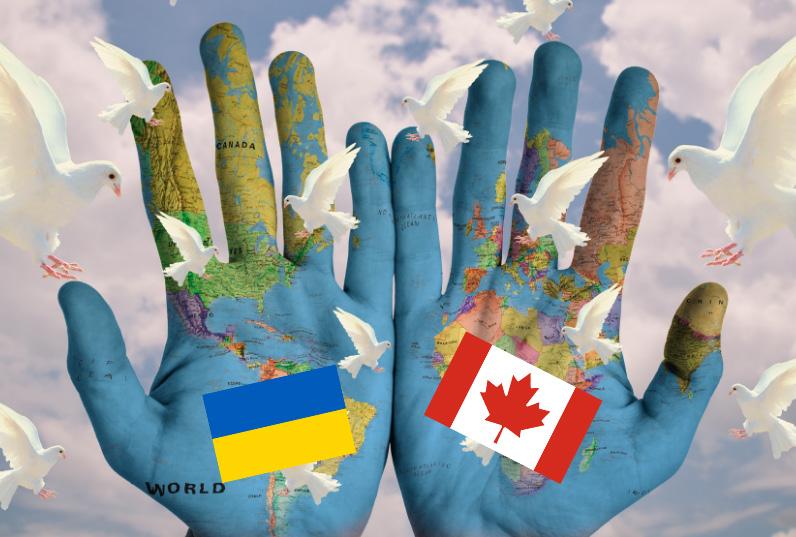
3 minute read
● Ukraine in Turmoil: A Canadian Perspective
from Pro Tem - Vol. 60 Issue 9
by Pro Tem
Michael Aquilino English Journalist
Readers Note: The information contained in this article is current as of March 8, 2022, and is subject to change as the situation in Ukraine continues to evolve. On February 24, 2022, Russian military forces stormed Ukraine, launching several attacks against Ukrainian cities. Underscoring the severity of the invasion, the National Post remarked that this is the first time since World War II that a European country has been threatened with the prospects of total conquest by another sovereign state. The situation in Ukraine is thus incredibly dire and advancing in ways that require immediate global attention. The roots of the crisis can be traced back to 2014, when Russia illegally occupied the Ukrainian territories of Crimea and Sevastopol, ultimately undermining Ukrainian sovereignty and territorial integrity. Russian influence upon Ukraine has since been extremely aggressive, threatening to destabilise the foundations upon which Ukraine is built. Russia has been reluctant to recognize Ukrainian independence, and, with Ukraine in pursuit of NATO acceptance, has taken measures to assert its dominance over the region. Be this as it may, the most recent developments north of the Black Sea are not constrained to Ukraine in their scope of consequence. The attacks, according to the Government of Canada, “threaten the values and principles that underpin international order” — encompassing global political, economic, social, and cultural effects. Democracy and the stability of Europe itself may be imperilled. Canada, the first Western country to recognize Ukraine’s independence from the recently-fallen Soviet Union on December 2, 1991, strongly condemns Russia’s “illegal and egregious” actions.. Ever since recognizing Ukraine, relations between Ukraine and Canada have been largely amicable — cooperating on matters such as security and defence, trade, and democratic and economic reform. Historically, Ukrainians have also played a remarkable role within Canadian culture. Attracted by agricultural prospects, the Canadian Encyclopaedia noted that the initial influx of Ukrainians into Canada occurred in the 19th century. According to Cochrane, Blidook, and Dyck’s (2021) work on Canadian politics, Ukrainian people were integral in 1960s Canadian cultural reform, successfully pressuring the government to recognize other ethnocultural groups in the country aside from those who spoke English or French. Ukrainian-Canadians demanded changes in public policies as well as verbal/moral support from their government. Such political and social pressure was a critical factor which facilitated the implementation of multiculturalism in Canada. Thus, as per Cochrane, Blidook, and Dyck (2021), Ukrainians have significantly contributed to the cultural pluralism that has come to characterise the country. In light of the robust connection that Canada and Ukraine share, and with Canada also housing the largest Ukrainian diaspora population outside of Russia, the Canadian government has been lending a helping hand during the crisis. On February 25, 2022, Canada launched a dollar-for-dollar donation initiative for crisis relief in Ukraine, where the government will match individual donations to the Canadian Red Cross (up to a maximum of $10 million) until March 18, 2022. Nevertheless, as CTV News has observed, Russia’s invasion of Ukraine will have many direct and grim implications for North America, including those regarding inflation, food/other goods prices, and immigration. Supply chains will be disrupted, and with Russia being a major supplier of the world’s oil and gas, a sharp increase at the pumps will ensue. Global markets, in many areas, will become unsettled, and their future, should the crisis continue to progress, looks bleak. Canadian imports from Ukraine are plentiful, including sunflower oil, sugar, chocolate, baked goods, vodka, iron and steel, apparel, ceramics, and minerals. With Ukrainian production in a state of disarray, Canadian shelves and factories may suffer. The events in eastern Europe could set a dangerous global precedent, or, should the world manage to drive Russia out of Ukraine, set a very encouraging one. In order to spare human life, destruction, and the economic, political, and social well-being of many countries, such violence in a contemporary context cannot be left to its own devices. As the world watches in fear, Western democracy must take a collective stand against the forces which threaten its cherished principles—ensuring a better and more harmonious future for all. On a concluding note, while the war may seem to be at arm’s length, in reality, it is much closer to home than some may presume. As such, and as has already been seen with demonstrations in Toronto and around the world, it is imperative that Canadians stand together with Ukraine during this time of crisis.
Advertisement









